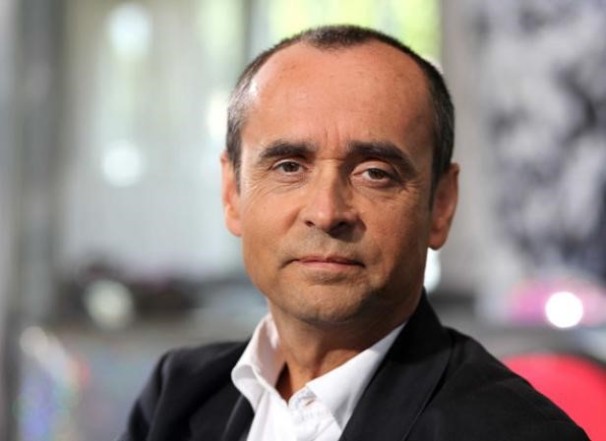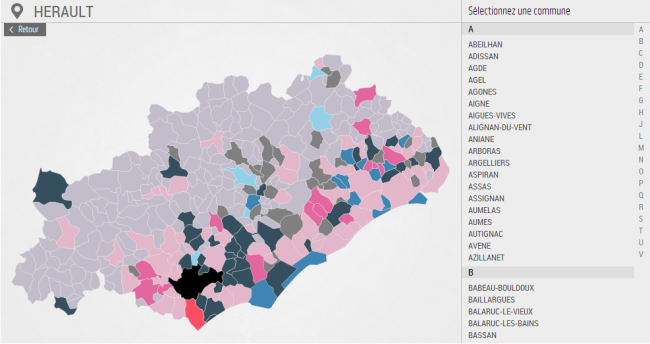I fear that this date will be forever regarded as one of the bleakest days for the citizens of Béziers. If not bleak, it will most certainly remain infamous. Today the candidate for France’s far right party (Front National) Robert Ménard was elected Mayor of Béziers in the local elections (élections municipales) with 44.8% of the vote. For any British reader, this may not seem too serious on a political level given that the mayor in most British towns is merely a ceremonial title with little power or influence. Politics in France however plays out on a much more regional level awarding mayors significant duties such as full control of the police. Now I do not claim to be a politics expert. There are however disadvantages of Béziers’ choice that are blaringly obvious to me from the time I have already spent here; disadvantages so clear that I must admit to finding the success of the FN difficult to fathom. On a superficial level, it may seem that the FN with its ‘zero-tolerance’ law and order policy and economic protectionism is the answer for a town with a high unemployment rate and problems with both immigration and unemployment. It could on the other hand aggravate problems inherently present in Béziers’ past political decisions.
Firstly, Béziers has always been isolated politically from its Languedoc-Roussillon neighbours. This is due to the fact that since 1995, it has voted UMP (the Conservative Party here in France) in a notoriously left-wing region in recent years. As noted before, regions hold a vast amount of power here. This has already affected Béziers in a number of ways. The school where I work, for example, was built in the village of Sérignan rather than Béziers. You may ask why when faced with the fact that the vast majority of both teachers and students including myself commute from Béziers. I am uncertain whether this is fact or mere rumour but my colleagues have often told me that this decision was made by the académie (the Local Education Authority) based in the Socialist city Montpellier as punishment to its UMP neighbour. The further alienation of Béziers as a now far-right town may have already commenced. Since Ménard’s election as mayor, a rugby friendly match between Béziers and Toulon (a town in Provence-Alpes-Côte d’Azur) has already been cancelled. The president of the local rugby team (l’ASBH) Cédric Bistué made a public statement about the decision saying ‘Je respecte sa decision [de Mourad Boudjellal, president du Rugby Club Toulonnais] mais je trouve dommage de mélanger politique et sport’ (‘I respect his decision [that of Mourad Boudjella, president of Toulon Rugby Club] but I do find it a shame to mix politics with sport’).
Robert Ménard.
Yet it is not merely the choice of political party that could be detrimental to Béziers but also its candidate Ménard. The inhabitants of Béziers hoping that Ménard will present a more decisive mayor at the helm of a town with growing economic and social problems may soon be disappointed. It seems that the new Mayor is a man whose personality and also political beliefs are in fact incredibly ambivalent. Born in Oran in 1953, he returned to France with his family when nine years old. After a brief period as an anarchist in the early 70s, he became a member of the Communist party and later the Socialist party. In 1985, he founded the non-governmental organisation ‘Reporters without Borders’ which quickly spread worldwide defending the freedom of the press. In the early 2000s, Ménard moved towards a more centrist and later right-wing politics which shocked many of his friends. He voted the conservative UMP presidential candidate Nicolas Sarkozy in the second round of both the 2007 and 2012 national elections. He now claims to support 80% of the FN’s political beliefs. This begs the question however of what are the remaining 20% with which he does not agree. Ménard shows an unwillingness to clarify much of this ambiguity. He is even unwilling to name his win a victory for the FN calling it rather a victory for the citizens of Béziers against the political class:
‘Personne ne peut assimiler ce qui s’est passé à Béziers à une victoire du Front national […] c’est surtout une victoire des citoyens contre la classe politique’
It is true that Ménard’s candidacy was supported by two other movements aside from the FN (Le Mouvement pour la France and le Rassemblement pour la France). It would however be misleading to state that this is not a victory shared by the FN. Ménard was unashamed of publishing his alliance with the Front National at the bottom of every leaflet that I received in my letterbox.
One could even argue that Ménard is experiencing an identity crisis when one considers his current attitude towards journalist; the same people he defended in the 80s. When he was approached to be interviewed by ‘Rue89’, he declared that its journalists were everything he hated and that they were ‘orduriers’ (‘obscene’) and ‘crapuleux’ (‘dissolute’). The following day however in an extraordinary turn of events, he agreed to the interview. He even claimed in 2012 that ‘Les meilleurs ennemis de la liberté de la presse, ce sont les journalistes.’ (‘the greatest enemies to the freedom of the press are the journalists themselves’). He has never fully explained why his opinion of journalists has gone through such a radical change. His personality has also shown itself to be incredibly complicated at times. In his interview with ‘Rue89’ for example, he presents himself at first as an empathising parent yet later states that homosexuality is a non-desirable trait (‘J’ai envie que mes enfants aient une sexualité hétérosexuelle’: ‘I want my children to be heterosexual’). Many of Ménard’s new constituents are Muslims and it is his change in mentality towards several aspects of Islam which are in particular worrying. Before he was against the banning of the hijab in public places yet is now inexplicably in favour of it. He said in his ‘Rue89’ interview that ‘Le voile est un problème par sa présence massive. Mais je combats l’idée que l’islam serait ontologiquement un problème, c’est une monstruosité’ (the veil is a problem due to its widespread presence. But I refute the idea that Islam is essentially a problem itself, that is a monstrous idea’). For now then, it seems that Ménard is not set against Islam. We have seen however that his opinions have the potential to change radically. What is to say that they will not once more with regards to the concept of Islam as aggressive to French identity?
The citizens of Béziers who voted the FN may have voted out of fear for their town; fear that they were losing their identity. Yet in the light of its Prefecture Montpellier electing the Miscellaneous Left (divers gauche) candidate Phillipe Saurel as their mayor, Béziers’ choice of an FN mayor could not have been a greater symbol of dissidence against Montpellier. Was it the right decision? Only time will tell but Béziers may have more to fear now with Ménard as its mayor than it did before.
Could Béziers stand out any more even being black marked as FN by the regional newspaper Midi Libre?
N.B. Translations of quotations are all my own.


